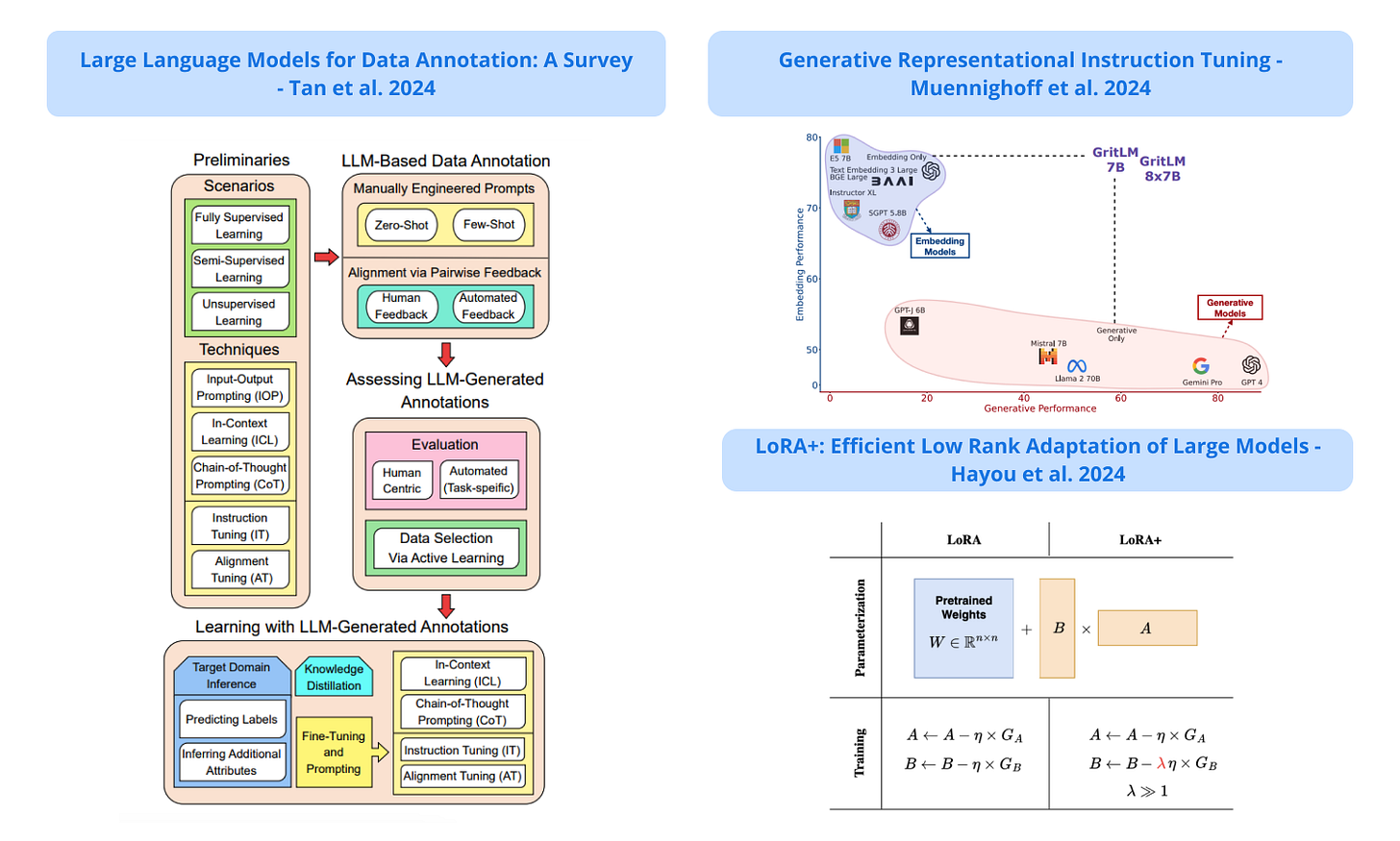🥇Top ML Papers of the Week
The Top ML Papers of the Week (Feb 19 - Feb 25)
1). Stable Diffusion 3 - a suite of image generation models ranging from 800M to 8B parameters; combines diffusion transformer architecture and flow matching for improved performance in multi-subject prompts, image quality, and spelling abilities; technical report to be published soon and linked here. (paper | tweet)
2). Gemma - a series of open models inspired by the same research and tech used for Gemini; includes 2B (trained on 2T tokens) and 7B (trained on 6T tokens) models including base and instruction-tuned versions; trained on a context length of 8192 tokens; generally outperforms Llama 2 7B and Mistral 7B. (paper | tweet)
3). LLMs for Data Annotation - an overview and a good list of references that apply LLMs for data annotation; includes a taxonomy of methods that employ LLMs for data annotation; covers three aspects: LLM-based data annotation, assessing LLM-generated annotations, and learning with LLM-generated annotations. (paper | tweet)
4). GRIT - presents generative representational instruction tuning where an LLM is trained to perform both generative and embedding tasks and designed to distinguish between them via the instructions; produces new state-of-the-art on MTEB and the unification is reported to speed up RAG by 60% for long documents. (paper | tweet)
5). LoRA+ - proposes LoRA+ which improves performance and finetuning speed (up to ∼ 2X speed up), at the same computational cost as LoRA; the key difference between LoRA and LoRA+ is how the learning rate is set; LoRA+ sets different learning rates for LoRA adapter matrices while in LoRA the learning rate is the same. (paper | tweet)
Sponsor message
DAIR.AI presents a live cohort-based course, Prompt Engineering for LLMs, that teaches how to effectively use advanced prompting techniques and tools to improve the capabilities, performance, and reliability of LLMs. Use promo code MAVENAI20 for a 20% discount.
6). Revisiting REINFORCE in RLHF - shows that many components of PPO are unnecessary in an RLHF context; it also shows that a simpler REINFORCE variant outperforms both PPO and newly proposed alternatives such as DPO and RAFT; overall, it shows that online RL optimization can be beneficial and low cost. (paper | tweet)
7). Recurrent Memory Finds What LLMs Miss - explores the capability of transformer-based models in extremely long context processing; finds that both GPT-4 and RAG performance heavily rely on the first 25% of the input, which means there is room for improved context processing mechanisms; reports that recurrent memory augmentation of transformer models achieves superior performance on documents of up to 10 million tokens. (paper | tweet)
8). When is Tree Search Useful for LLM Planning - investigates how LLM solves multi-step problems through a framework consisting of a generator, discriminator, and planning method (e.g., iterative correction and tree search); reports that planning methods demand discriminators with at least 90% accuracy but current LLMs don’t demonstrate these discrimination capabilities; finds that tree search is at least 10 to 20 times slower but regardless of it good performance it’s impractical for real-world applications. (paper | tweet)
9). CoT Reasoning without Prompting - proposes a chain-of-thought (CoT) decoding method to elicit the reasoning capabilities from pre-trained LLMs without explicit prompting; claims to significantly enhance a model’s reasoning capabilities over greedy decoding across reasoning benchmarks; finds that the model's confidence in its final answer increases when CoT is present in its decoding path. (paper | tweet)
10). OpenCodeInterpreter - a family of open-source systems for generating, executing, and iteratively refining code; proposes a dataset of 68K multi-turn interactions; integrates execution and human feedback for dynamic code refinement and produces high performance on benchmarks like HumalEval and EvalPlus. (paper | tweet)



Great content